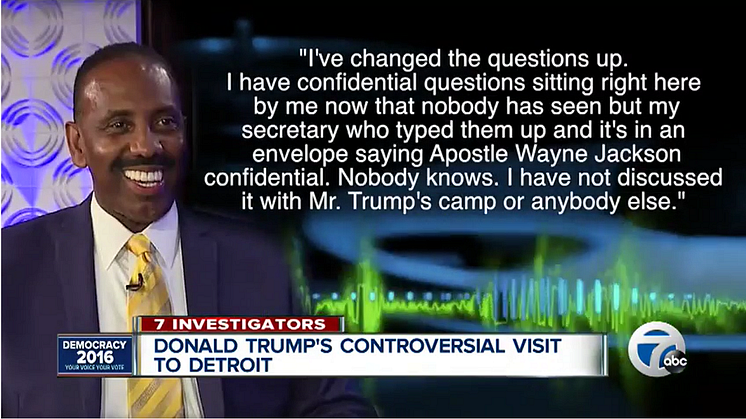
News -
What happens if you are exposed for scripting answers to supplied interview questions?
Media spokespeople can learn some important lessons from the embarrassing revelation last week that Donald Trump had received questions ahead of a recorded television interview. Worse, his advisors had scripted answers. These were then published by the New York Times. Predictably, Mr Jackson changed the questions.
There was a time when journalists would quietly accept the fact that corporate and government spokespeople were trained to appear in the media, and were armed with talking points. I have long described the dynamic between journalists and spokespeople as a tug o' war, with each side trying to get the other to cross the line.
But when the media leaps on a US presidential candidate for having such talking points, and shines a light on the stage management and media choreography that goes on, we are starting to see a shift in whether the media is willing to play along.
Perhaps the New York Times' expose titled "Leaked Script Shows What Advisers Want Donald Trump to Say at Black Church" shows the liberal bias the Republicans have long accused the media of. Perhaps it's just that Trump has alienated members of the media with his abrasive style, like he has so many other groups, and they're paying him back.
But maybe the New York Times, which has previously highlighted that President Obama uses a teleprompter "for everyday routine announcements, and even for the opening statement at his news conference", just wants to push politicians to get real in the YouTube era where raw authenticity beats slick production.
So here's the latest NYT report about Trump, which exposes, among other things:
"Instead of speaking to the congregation at Great Faith Ministries International, Mr. Trump had planned to be interviewed by its pastor in a session that would be closed to the public and the news media, with questions submitted in advance. And instead of letting Mr. Trump be his freewheeling self, his campaign prepared lengthy answers for the submitted questions, consulting black Republicans to make sure he says the right things.
"The document includes the exact wording of answers the aides are proposing for Mr. Trump to give to questions about police killings, racial tension and the perception among many black voters that he and the Republican Party are racist, among other topics."
Television viewers would also have been made acutely aware of the stage management that goes on, when Florida Attorney-General Pam Bondi complained that CNN's Anderson Cooper didn't stick to the agreed questions in their controversial interview.
I've commented on this topic before, so I won't go into all the details except to say this: if you are a media spokesperson, and you are used to having a cozy relationship with journalists, and for questions supplied in advance, don't be surprised if, at some point in the future, you are criticsed for it.
The fact that Mr Jackson then changed the questions should also be an eye-opener if you are used to receiving questions in advance: there are no guarantees the reporter will stick to the questions. Heck, he might not ask any of the supplied ones at all. And in the YouTube era, there is nothing you can do about it.
Clearly, you need to be prepared. But the more you train to hold your own in an interview without a teleprompter, questions sent in advance, or talking points, the better off you will be.
